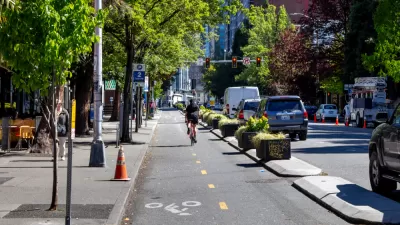By prioritizing a multi-modal approach and preserving existing vehicle space, the Seattle Department of Transportation risks abandoning the goals of its bicycle master plan.

The Seattle Department of Transportation (SDOT) is defending the decision to eliminate planned bike lanes on 35th Ave NE, arguing that removing the dedicated bicycle space will allow for more efficient transit movement through the area. SDOT Director Sam Zimbabwe blamed "outdated" modal plans that don't "play nice" with each other. The agency is developing a new framework for resolving conflicts between modes, but it's unclear where and how bike infrastructure will be prioritized.
So far, the proposed policy prioritizes pedestrians in "urban centers and villages," transit between neighborhoods, and goods movement in industrial centers. The bicycle network will receive priority "at critical connections" where it will "share priority with pedestrians," signaling support for multi-use paths and trails rather than dedicated bike lanes.
"From what I have seen, it’s mostly a way of preserving the status quo," said Anna Zivarts, a pedestrian advisory board representative on SDOT's Policy and Operations Advisory Group (POAG). Bryce Kolton, a representative from POAG's transit advisory board, echoed similar concerns, citing a reluctance on the part of the city to redistribute street space away from single occupancy vehicles. "Until they can tell me why established plans have not been completed when they aren’t for car traffic … I don’t think a multi-multimodal plan is the answer."
Ryan Packer, writing for Seattle Bike Blog, acknowledges that there are still a lot of questions about how a more multi-modal transportation plan will affect bike infrastructure, but with almost no space reallocated from vehicles to bicycles, the "skeletal" policies proposed within the new framework seem to walk back the more ambitious goals of the past.
FULL STORY: The end of the Bicycle Master Plan as we know it?

Alabama: Trump Terminates Settlements for Black Communities Harmed By Raw Sewage
Trump deemed the landmark civil rights agreement “illegal DEI and environmental justice policy.”

Study: Maui’s Plan to Convert Vacation Rentals to Long-Term Housing Could Cause Nearly $1 Billion Economic Loss
The plan would reduce visitor accommodation by 25% resulting in 1,900 jobs lost.

Planetizen Federal Action Tracker
A weekly monitor of how Trump’s orders and actions are impacting planners and planning in America.

Federal Homelessness Agency Places Entire Staff on Leave
The U.S. Interagency Council on Homelessness is the only federal agency dedicated to preventing and ending homelessness.

Restoring Northern India’s Himalayan ‘Water Temples’
Thousands of centuries-old buildings protect the region’s natural springs and serve as community wells and gathering places.

Milwaukee to Double Bike Share Stations
Bublr Bikes, one of the nation’s most successful, will add 500 new e-bikes to its system.
Urban Design for Planners 1: Software Tools
This six-course series explores essential urban design concepts using open source software and equips planners with the tools they need to participate fully in the urban design process.
Planning for Universal Design
Learn the tools for implementing Universal Design in planning regulations.
Caltrans
Smith Gee Studio
Institute for Housing and Urban Development Studies (IHS)
City of Grandview
Harvard GSD Executive Education
Toledo-Lucas County Plan Commissions
Salt Lake City
NYU Wagner Graduate School of Public Service





























